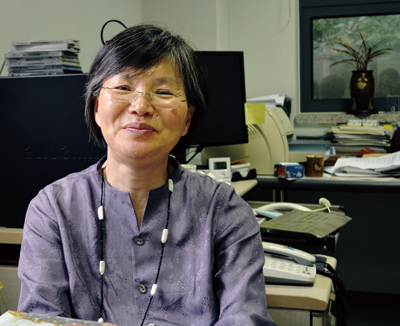“I was once discriminated because I was a female scientist.”

When professor Lee returned to Korea in 1986 with a doctoral degree from Stanford University, accompanying her husband, the couple applied to work together at the same research lab in Daejeon. Her husband was immediately hired as a senior researcher, but the response that professor Lee received was, “only temporary positions are open for women since all other female researchers currently working here are temporary.” professor Lee refused to accept the temporary position and found another position at the Korea Research Institute of Standards and Science.
“My husband and I completed the same course of study and had the same backgrounds, but most of the private research laboratories and government institutions in our society back then did not want to hire women,” professor Lee said. “I chose not to make an impression as a typical woman anyway because I did not want to set another bad example for other female scientists who wished to work in research labs. They would be getting the same answer as I had, along with the excuse that, ‘even professor Lee Gong-joo is working as a temporary researcher. How can we offer you a permanent position?’”
Through that experience, professor Lee strongly felt that female networks needed to be established for female scientists and engineers who were minors in the field and thus without a strong voice. Professor Lee became one of the founding members of the Association of Korean Women Scientists and Engineers (KWSE).
“In 1993 when KWSE was first organized, there were no other networking organizations for women scientists and engineers,” professor Lee said. “Back then with no Internet, we had to phone each and every female scientist and engineer. All of the scientists and engineers heartily welcomed the organization.”
In no less than a couple of decades, with a strong female network and a combination of changed social atmosphere and government support, females in scientific and engineering fields no longer stood alone. With that success, professor Lee turned her attention toward helping women scientists in developing countries within Asia and Africa.
She worked hard in organizing a worldwide network for female scientists and engineers, called the International Network of Women Engineers and Scientists (INWES).
In July 22 of 2011, professor Lee became its third president, and its first president from the Asian and African continents. As the president of INWES, professor Lee collects the experiences and know-hows of successful female scientists and engineers. She then imparts them to women in the same fields in developing countries struggling through ordeals similar to those that professor Lee and others from developed countries have gone through already.
Female scientists and engineers who take part in the meetings of INWES often share their difficulties and ask for assistance.
“Women share similar problems in balancing their professional work with caring for their families, and this probably isn’t limited to scientific or engineering fields,” professor Lee said. “Older and more prominent women scientists or engineers from developed countries were in similar situations or had similar problems. They are willing to share how they overcame those limitations and climbed up the career ladder with scientists and engineers from newly developing countries in Asia and Africa.”
The scientists share their problems, and others offer their own solutions.
“It was not intended to be, but many people call it a ‘sister network,’” professor Lee said.
Professor Lee stresses that women possess certain traits and skills more than men, such as organizational ability, scrupulousness, nurturing qualities, and so on.
“Once women begin to network, they can maximize these traits and skills. I hope I can see the day when there are more women than men in scientific and engineering fields.”
With role models such as professor Lee Gong-joo, the day for women scientists and engineers to achieve success may be closer than many people realize.
Oh Yoon
bonjoureunice@ewhain.net

